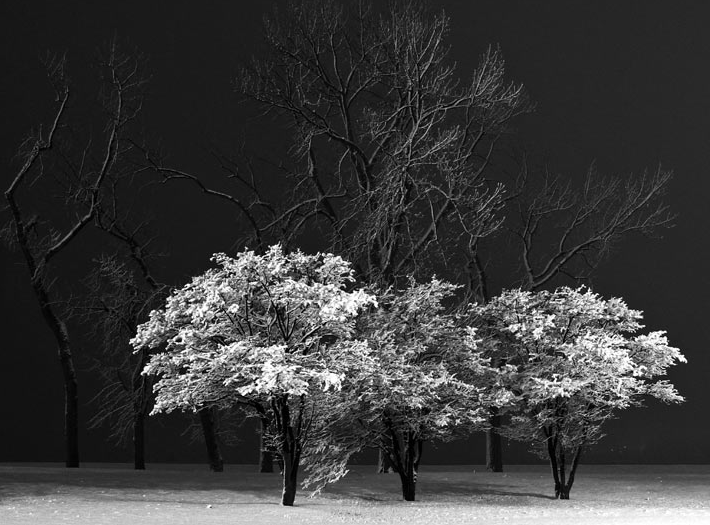Winter brings snow, cold, blizzards–and photographs of everything from cars in the ditch to crowded airports to rural landscapes blanketed in solitude. Each of these images has its purpose, but even so they can quickly become as conventional as a Christmas card. Although the image below isn’t unique, I think it gives us more than the usual seasonal sentiments.
The influence of Ansel Adams is obvious, but the photographer has achieved something by avoiding Adams’ monumental scale. These trees along Lake Michigan have instead a ghostly quality to them, as if along the shore of the underworld. Their white canopies have pulled what light remains close to them, although only to give relative warmth. Snow is where leaves might be, and grass, while the sky and water that should be full of light and reflected light are dark. Although not a warm world, it remains beautiful, one where essential forms still can be traced–until they, too, dissolve back into nothingness.
Photography has been accused of corrupting experience by beautifying reality. One might ask if that aesthetic impulse always deserves censure, but let me take a different path today. I don’t know of similar critiques of the verbal genre of the elegy–“a mournful, melancholy, or plaintive poem, especially a lament for the dead”–despite its aesthetic distinction. Consider how this photograph can be elegiac: It marks, with subtlety and beauty, all that we can experience as cooling, loss, and mortality. The beauty of what remains in this winter scene testifies to how much lies dead or dormant, unable to thrive until there is another turn of the great wheel.
Perhaps we should dwell in this attitude for a moment. Aside from the weather, we seem to be living in an overheated world. Whether caught up in the drama of war or gushing about the new administration heading to Washington, the news rushes along with little pause for reflection. Despite anguish over the war dead in the Middle East, the pain is by turns either localized or abstracted but never cause for meditating on our common humanity. Despite heated arguments about the economy or the latest entertainment awards or the playoffs or whatever, no one seems able to take a deep breath, calm down, and listen.
The story is told that when General Stonewall Jackson was in his death throes, he was at first wildly giving commands for battle, but then paused, smiled, and said, “Let us cross over the river, and rest under the shade of the trees.” Jackson may have been imagining lush magnolias, but surely the trees above would do as well.
Photograph by Jakub Bomba from the Daily Dozen for January 12, 2009 at NationalGeographic.com.

Enjoyed your posting.
And, as sure as the Spring follows the Winter, it brought to mind this wonderful poem by Robert Frost:
Spring Pools
These pools that, though in forests, still reflect
The total sky almost without defect,
And like the flowers beside them, chill and shiver,
Will like the flowers beside them soon be gone,
And yet not out by any brook or river,
But up by roots to bring dark foliage on.
The trees that have it in their pent-up buds
To darken nature and be summer woods—
Let them think twice before they use their powers
To blot out and drink up and sweep away
These flowery waters and these watery flowers
From snow that melted only yesterday.